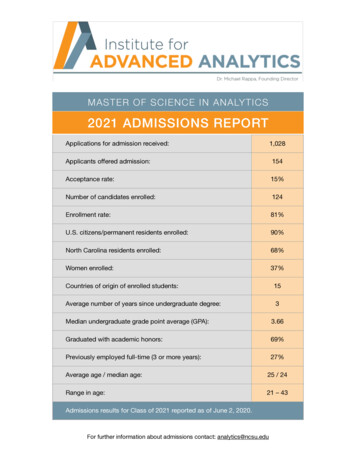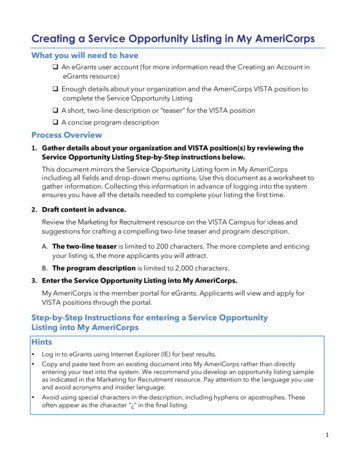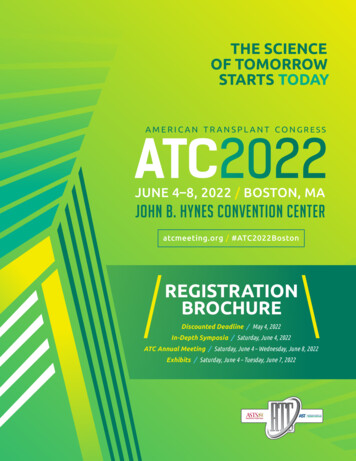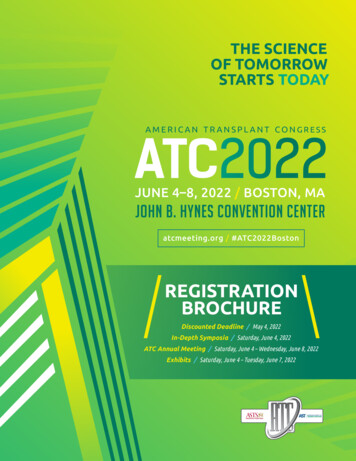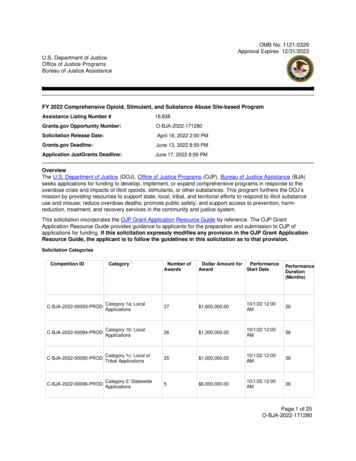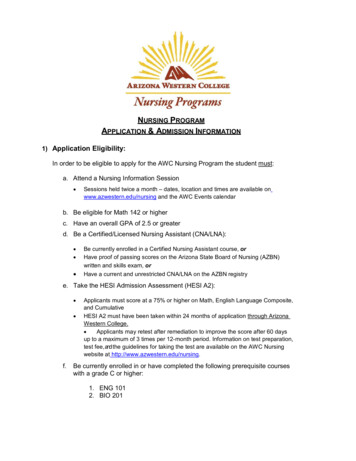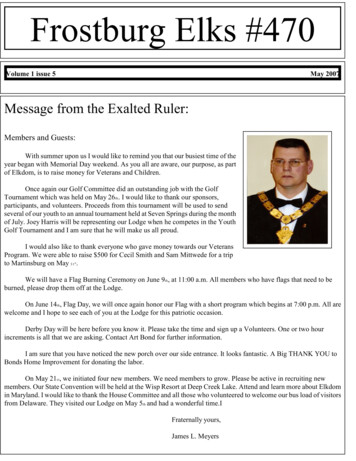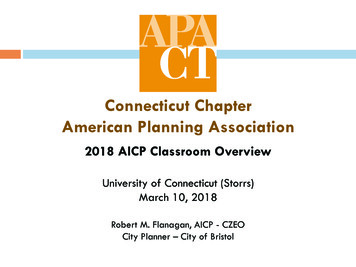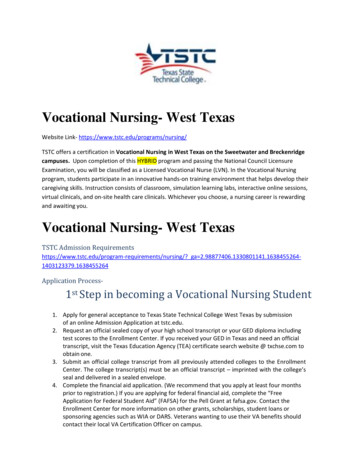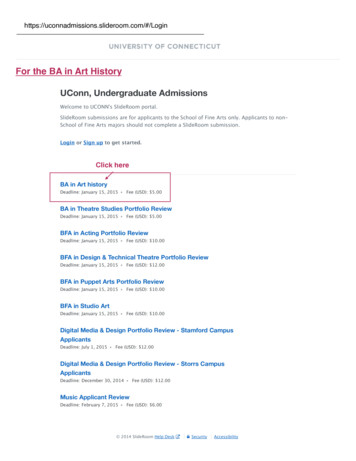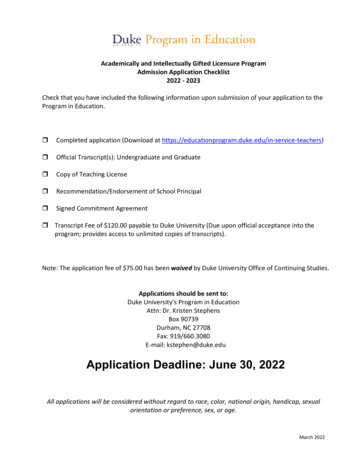
Transcription
Academically and Intellectually Gifted Licensure ProgramAdmission Application Checklist2022 - 2023Check that you have included the following information upon submission of your application to theProgram in Education.rCompleted application (Download at ers)rOfficial Transcript(s): Undergraduate and GraduaterCopy of Teaching LicenserRecommendation/Endorsement of School PrincipalrSigned Commitment Agreementr Transcript Fee of 120.00 payable to Duke University (Due upon official acceptance into theprogram; provides access to unlimited copies of transcripts).Note: The application fee of 75.00 has been waived by Duke University Office of Continuing Studies.Applications should be sent to:Duke University’s Program in EducationAttn: Dr. Kristen StephensBox 90739Durham, NC 27708Fax: 919/660.3080E-mail: kstephen@duke.eduApplication Deadline: June 30, 2022All applications will be considered without regard to race, color, national origin, handicap, sexualorientation or preference, sex, or age.March 2022
Academically and Intellectually Gifted (AIG) Licensure ProgramOverview of Course SequenceDuke University’s Program in Education is pleased to offer non-degree, graduate coursework towards AIGlicensure for teachers. 2022 – 2023 program participants will take all four courses in the samesequence. Classes are held in the afternoon/early evening, meet once per week, and are scheduledas follows:Fall 2022 Semester (September– December):ü EDUC 620: Nature and Needs of the GiftedSpring 2023 Semester (January – April):ü EDUC 621: Methods and Materials for Teaching the GiftedSummer 2023 (Mid May – Late July):ü EDUC 622: Curriculum Development for the Giftedü EDUC 623: Practicum in Gifted EducationTuition & Fees: 700 per course. There is also a 120 transcript fee due upon acceptance into theprogram. Students are also responsible for purchasing their own textbooks.Academic Program Requirements: The Program in Education has identified five official datacollection points at which the program director, faculty, and other supervisors will make formalassessments of a candidate’s mastery of the Academically & Intellectually Gifted: Standards &Indicators Academically or Intellectually Gifted Add-On Licensure. These points are: 1) admissions,2) at completion of first course, 3) pre-practicum, 4) at the end of the practicum, and 5) one yearfollowing program completion. If a student's GPA at the end of the first semester falls under 3.0 (B),the student will be placed on academic probation. Only one probationary semester is allowed priorto the practicum. If a student’s cumulative GPA falls under 3.0 (B) for both the fall and springsemesters, the candidate’s continued participation in the program will be reviewed by the programdirector in collaboration with the school system and the AIG Advisory Committee, with decisionsregarding program continuation made on a case-by-case basis.Criteria for licensure recommendation: Upon successful completion of the above four courses (12semester hours; cumulative GPA of 3.0 or higher), Duke University’s Program in Education willrecommend candidates to the North Carolina Department of Public Instruction for AIG add-onlicensure (K-12).2March 2022
Cohort Details and Delivery Formats: Teachers from all school systems (public or private) are welcome tojoin either cohort as suitable.Campus Cohort (Teachers who are within a 30- to 45-minute drive from Durham)§ Classes are delivered via a hybrid model on Thursdays from 5 – 7 PM as follows:o 3 Face-to-Face meetings per semester on Duke’s campuso 9 synchronous, virtual class meetings per semester via Zoom.Distance Cohort (Teachers who are an hour or more drive from Durham)§ Classes are delivered via a hybrid model as follows:o 3 Face-to-Face meetings per semester on selected Saturdays from 10 AM – 2 PM onthe campus of Duke University OR hosted at a school district site.o 9 synchronous, virtual class meetings per semester via Zoom on Tuesdays from 5 –7 PM.Summer PracticumParticipants will design a curriculum unit as part of EDUC 622 and teach that curriculum in a one-weeksummer enrichment camp as a part of the summer practicum course (EDUC 623). The enrichment campserves rising 4th-8th grade gifted students and is offered at various locations to accommodate programparticipants.3March 2022
Application to Become a Candidate for AIG Teacher Licensure2022 – 2023APPLICANT INFORMATIONFor which Cohort are you applying?Name:FirstMiddler Campusr DistanceMaidenSSN #LastHome Telephone:Cell:Preferred e-mail:Permanent Mailing Address:StreetCityStateZipDate of Birth:Gender:Ethnicity/Race:Marital Status:# Years of Teaching Experience:EMPLOYMENT INFORMATIONSchool System:School:Principal:School Address:School Telephone:Grade/Subject Assignment:Licensure Areas:4Renewal Year:March 2022
ACADEMIC INFORMATIONUndergraduate EducationDates of AttendanceDegreeGraduate ProgramsDates of AttendanceDegreeBriefly discuss any other information about yourself that you feel is pertinent (e.g., proficiency in alanguage other than English, areas of specialized training, etc.).5March 2022
Please respond to the following questions.TEACHING EXPECTATIONS1. How definite are your plans to become licensed as an Academically/ Intellectually Gifted (AIG)teacher?2. Discuss why you have decided to pursue AIG certification.3. The question “What do teachers need to know and be able to do?” is an essential one foreducators. What types of knowledge, skills, and experiences do you desire and expect to obtainfrom your participation in the Academically/Intellectually Gifted (AIG) Licensure Program?6March 2022
PERSONAL VIEWS ON TEACHING1. Discuss your philosophy and/or model of effective teaching.2. Describe personal qualities or abilities you possess which you believe will help you become aneffective teacher of academically and intellectually gifted students.7March 2022
Please respond to the following questions:1. Have you read and do you understand the information concerning the admission process, thecourse sequence, academic program requirements, and criteria for licensure recommendation?r Yesr No2. Have you read and do you understand the North Carolina State Department of PublicInstruction’s Standards & Indicators for Academically and Intellectually Gifted Add-On Licensure(attached).r Yesr NoBy signing below, I acknowledge that I have received and read the information in this disclosure.Signature8DateMarch 2022
CONFIDENTIALPrincipal’s Recommendation and Endorsementis applying for admission to the Duke UniversityAcademically/Intellectually Gifted Add-On Licensure Program. The Program in Education wouldappreciate a confidential rating and statement indicating your opinion concerning this teacher’s likelysuccess as a program candidate.Dr. Kristen R. StephensE-mail: kstephen@duke.eduPlease complete and return this form to:The applicant’s signature below indicates his/her willingness to allow this evaluation to remainconfidential.Signature of applicant: Date:UnknownSuperiorGoodAverageFairPoorPlease rate the applicant on the following:Instructional PlanningInstructional Delivery/TeachingKnowledge of ContentStudent/Teacher RelationsCommunication SkillsLeadershipCritical ThinkingReliabilityIntegrityTeacher’s Strengths:Areas for Improvement:Principal’s Name:School:Principal’s Signature: Date:March 2022
Academically and Intellectually Gifted (AIG) Add-On Licensure ProgramCOMMITMENT AGREEMENT2022 - 2023You are applying for the 2019 – 2020 cohort of the Duke University AIG Licensure Program. Participantswill take all four required courses in the same sequence as follows.Fall 2022 Semester (September– December):ü EDUC 620: Nature and Needs of the GiftedSpring 2023 Semester (January – April):ü EDUC 621: Methods and Materials for Teaching the GiftedSummer 2023 (Mid May – Late July):ü EDUC 622: Curriculum Development for the Giftedü EDUC 623: Practicum in Gifted EducationThere are no alternate paths and/or exceptions to this course sequence.The AIG Licensure Program is a non-degree program offered through the graduate school. Uponsuccessful completion of the above four courses (12 semester hours; cumulative GPA of 3.0 or higher),Duke University’s Program in Education will recommend candidates to the North Carolina Departmentof Public Instruction for AIG licensure (K-12).Duke University, as a community of scholars, expects all students to cooperate in developing andmaintaining high academic standards. If a student's GPA at the end of the first semester falls under 3.0(B), the student will be placed on academic probation. Only one probationary semester is allowed priorto the practicum. If a student’s cumulative GPA falls under 3.0 (B) for both the fall and spring semesters,the candidate’s continued participation in the program will be reviewed by the program director incollaboration with the school system and the AIG Advisory Committee, with decisions regardingprogram continuation made on a case-by-case basis.Students enrolled in the AIG Licensure Program must be open to expanding their knowledge and pledgeenthusiastically to pursue and complete all required assignments as prescribed by course instructors. Inaddition to the demanding workload within your classroom at your respective school system, the DukeUniversity AIG licensure program is rigorous and will also require a substantial time commitment.By accepting admission into the Duke University AIG licensure program, you are indicating yourunderstanding of the above requirements and your willingness to subscribe to them.I,, understand the requirements for the Duke University AIGPrint nameAdd-On Licensure Program and accept probationary admission into the Program.SignatureDate10March 2022
NORTH CAROLINA DEPARTMENT OF PUBLIC INSTRUCTIONSTANDARDS & INDICATORS FORACADEMICALLY OR INTELLECTUALLY GIFTED ADD-ON LICENSURETeacher education programs and field-based providers of professional development should use these standards andindicators to plan, implement and deliver courses leading to North Carolina add-on licensure in Academically orIntellectually Gifted (AIG). These standards and indicators are aligned with those of the Council for ExceptionalChildren (CEC), the National Council for Accreditation of Teacher Education (NCATE), the Interstate New TeacherAssessment and Support Consortium (INTASC) and the National Board for Professional Teaching Standards(NBPTS). The INTASC standards, in particular, provided a strong framework for developing these standards andindicators.The AIG standards and indicators extend beyond the above frameworks to describe the specialized knowledge, skillsand dispositions expected of a teacher who is prepared to teach AIG students in grades K-12. As such, the standardsrepresent outcomes of courses and experiences. These standards and indicators do not address the additionalknowledge, skills and preparation required for administrators of gifted education programs or professional staffdevelopers.AIG add-on licensure constitutes 12 semester hours (180 hours) of graduate study or the equivalent beyond licensurein an academic content area or grade level. The following standards and indicators are the minimum required for allteachers of AIG students.STANDARD 1: TEACHERS OF THE GIFTED UNDERSTAND THE HISTORICAL FOUNDATIONS AND APPLY CURRENTRESEARCH ABOUT GIFTED EDUCATION. INDICATOR 1.1 - Teachers know the historical foundations, significant research studies and major contributors inthe field of gifted education.INDICATOR 1.2 - Teachers know the state legislation regarding the education of gifted students, including the stateand local definitions.INDICATOR 1.3 - Teachers know the journals, books and professional organizations relevant to the field of giftededucation.INDICATOR 1.4 - Teachers understand current research findings and can articulate significant issues in the field ofgifted education.INDICATOR 1.5 - Teachers apply research findings to their teaching practice.INDICATOR 1.6 - Teachers understand the importance of continued participation in the studies of gifted educationthrough attendance of seminars, workshops, institutes and conferences.STANDARD 2: TEACHERS OF THE GIFTED ASSESS THE COGNITIVE AND AFFECTIVE NEEDS OF GIFTED LEARNERSAND PLAN INSTRUCTION TO MATCH THE LEARNERS’ NEEDS REGARDLESS OF HOW—OR WHEN—THESE ABILITIESARE MANIFESTED. INDICATOR 2.1 - Teachers can explain local nomination and identification procedures for gifted students.INDICATOR 2.2 - Teachers know legal provisions, terminology, regulations and guidelines regarding unbiasedassessment.INDICATOR 2.3 - Teachers use multiple performance-based assessments to identify gifted students and to plan forand provide appropriate instruction.INDICATOR 2.4 - Teachers recognize the characteristics and special cognitive needs of the gifted (including thehighly gifted) and plan instruction accordingly.INDICATOR 2.5 - Teachers recognize the characteristics and special cognitive needs in order to modify instructionappropriately for gifted students who have other exceptionalities (e.g., learning disabilities, attentiondeficit/hyperactivity disorder and autism).INDICATOR 2.6 - Teachers recognize that giftedness may manifest as early as pre-school and continues to do sothrough adolescence; teachers employ strategies for nurturing the development of giftedness whenever itappears.11March 2022
STANDARD 3: TEACHERS OF THE GIFTED DESIGN CURRICULUM USING KEY CONCEPTS OF THE ACADEMICDISCIPLINES WHILE INTEGRATING COMPLEX AND ADVANCED CONTENT. INDICATOR 3.1 - Teachers understand and use research-supported strategies for gifted students (e.g. conceptualdevelopment, accelerated pace, problem-based learning, critical thinking skills, interdisciplinary curriculum andconcept-based units).INDICATOR 3.2 - Teachers use the skills of inquiry to ignite independent learning in a collaborative environment.INDICATOR 3.3 - Teachers develop their students’ metacognitive thinking using complex questions, reflection andself-evaluation.INDICATOR 3.4 - Teachers differentiate The North Carolina Standard Course of Study and other curricula byappropriate modifications to content, process, product and learning environment.INDICATOR 3.5 - Teachers can apply, analyze, implement and evaluate various methods and models of giftededucation.INDICATOR 3.6 - Teachers can incorporate subject content two or more years beyond grade level.STANDARD 4: TEACHERS OF THE GIFTED UNDERSTAND AND ADDRESS THE INTELLECTUAL, SOCIAL ANDEMOTIONAL NEEDS OF GIFTED LEARNERS. INDICATOR 4.1 - Teachers understand and address such issues as over-sensitivity, perfectionism and peerpressure.INDICATOR 4.2 - Teachers implement strategies to address underachievement in gifted students.INDICATOR 4.3 - Teachers understand and address issues of gender, ethnicity, poverty and home language asthey relate to the needs of gifted students.INDICATOR 4.4 - Teachers collaborate with appropriate school personnel to address the achievement motivation,emotional development, health and social behaviors of gifted learners.INDICATOR 4.5 - Teachers understand and address the unique needs of highly gifted students.STANDARD 5: TEACHERS OF THE GIFTED UNDERSTAND THE ROLE OF CULTURE IN THE EDUCATION OF GIFTEDSTUDENTS. INDICATOR 5.1 - Teachers understand the role of culture in the recognition and measurement of intelligence andabilities.INDICATOR 5.2 - Teachers understand cultural issues of gifted students (ethnic, socioeconomic, and homelanguage status) and ensure that they are identified equitably and served appropriately.INDICATOR 5.3 - Teachers instruct with sensitivity to the cultural and linguistic uniqueness of gifted learners.STANDARD 6: TEACHERS OF THE GIFTED ADVOCATE FOR GIFTED STUDENTS IN MULTIPLE VENUES. INDICATOR 6.1 - Teachers collaborate effectively with their colleagues in general and special education to providea range of service delivery options for gifted students.INDICATOR 6.2 - Teachers communicate and collaborate with diverse groups (parents, administrators, communityorganizations and political leaders) to advocate for appropriate services for gifted students.INDICATOR 6.3 - Teachers serve as a link to resources for gifted students beyond the school (e.g., out-of-schoolactivities, summer programs, Web sites and university opportunities).12March 2022
Note: The application fee of 75.00 has been waived by Duke University Office of Continuing Studies. Applications should be sent to: Duke University's Program in Education Attn: Dr. Kristen Stephens Box 90739 Durham, NC 27708 Fax: 919/660.3080 E-mail: kstephen@duke.edu Application Deadline: June 30, 2022
